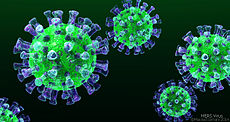Visit and Join the WeHeal MERS Community
For more information, see: CDC | Wikipedia

Middle East Respiratory Syndrome (MERS) is an illness caused by a virus (more specifically, a coronavirus(http://www.cdc.gov/coronavirus/index.html)) called Middle East Respiratory Syndrome Coronavirus (MERS-CoV). MERS affects the respiratory system (lungs and breathing tubes). Most MERS patients developed severe acute respiratory illness with symptoms of fever, cough and shortness of breath. About 3-4 out of every 10 patients reported with MERS have died. Most people confirmed to have MERS-CoV infection have had severe acute respiratory illness with symptoms of:
•fever
•cough
•shortness of breath
Some people also had gastrointestinal symptoms including diarrhea and nausea/vomiting. For many people with MERS, more severe complications followed, such as pneumonia and kidney failure. About 3-4 out of every 10 people reported with MERS have died. Most of the people who died had an underlying medical condition. Some infected people had mild symptoms (such as cold-like symptoms) or no symptoms at all; they recovered.
Based on what researchers know so far, people with pre-existing medical conditions (also called comorbidities) may be more likely to become infected with MERS-CoV, or have a severe case. Pre-existing conditions from reported cases for which we have information have included diabetes; cancer; and chronic lung, heart, and kidney disease. Individuals with weakened immune systems are also at higher risk for getting MERS or having a severe case.
Based on information we have to date, the incubation period for MERS (time between when a person is exposed to MERS-CoV and when they start to have symptoms) is usually about 5 or 6 days, but can range from 2-14 days.
MERS-CoV has spread from ill people to others through close contact, such as caring for or living with an infected person. Infected people have spread MERS-CoV to others in healthcare settings, such as hospitals. Researchers studying MERS have not seen any ongoing spreading of MERS-CoV in the community.
All reported cases have been linked to countries in and near the Arabian Peninsula. Most infected people either lived in the Arabian Peninsula or recently traveled from the Arabian Peninsula before they became ill. A few people became infected with MERS-CoV after having close contact with an infected person who had recently traveled from the Arabian Peninsula.
Public health agencies continue to investigate clusters of cases in several countries to better understand how MERS-CoV spreads from person to person
Visit and Join the WeHeal MERS Community
For more information, see: CDC | Wikipedia
WeHeal is very grateful to our valued sources of information which include Wikipedia, WebMD, ClinicalTrials.gov, Cancer.gov, Infoplease, and the US CDC (Center for Disease Control).